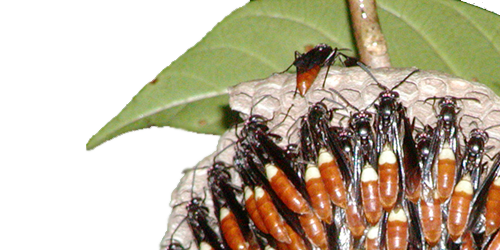About Apoica
Apoica is a word that has meant many things to me over my life. It is a genus of social wasps that formed the primary basis of my doctoral dissertation, and has continued to serve me well as a study group for understanding transitions in social habit: how selfish, solitary individuals can be transformed into groups that share resources, and indeed care for one another.
In the original french description of 1836, the author of the genus, Lepeletier, refers to the etymology: ”colonie, peuplade” [colony, tribe]. But as was typical of taxonomists of the time, that etymological description leaves much to scratch your head about. Athenian colonies were called “apoikas” by the ancient Greeks. So the Greeks used this word to refer to these outposts. But just as much as “colony,” Apoica means “home away from home” or “satellite home.” Lepeletier gave the genus this name, surely because new colonies of these wasps are formed by small cohorts leaving the natal nest and forming outposts, incipient colonies, which grow over a season and ultimately split again. This is the swarming habit of Apoica. Some stay at the original nest and some go and start another colony, a satellite nest, or a “home away from home.”
But this is not a blog about wasps per se; it is a blog about my experience and view as a biologist, of the process of modern stem cell transplantation—a process I am experiencing now. So this is about populations that split off from the parental swarm and colonize new territory. It is about the social contract—about cooperation and conflict, of patient and physicians, of misplaced cells and cells that find themselves in the company of misplaced cells, of my “rogue” individualist cancer cells and my compliant, “normal” cells that have kept the social contact—the social contract that is me. It is a blog that will, at times I suspect, be about my complaints with what is often a disappointing medical establishment. At times I will may praise that very same establishment. The blog will surely be about patient advocacy, or perhaps my gratitude for the few physicians and nurses who deserve it. But, to the best of my ability, it will not be mere journaling; at all times I will attempt to honor Sontag’s admonition against mere monologue—another story by another person with cancer. And like Sontag, I will not use the metaphor of wasps to stretch reality to my own ends; the metaphor of wasps—the conflict of solitary and sociality—is all too real in this case.
Above all, this blog is about altruism: The altruism of people (including my donor, to be sure), but also the fundamental quandary of altruism: Why do entities cooperate? Can only related individuals form successful groups, or can unrelated populations strive? Darwin spoke famously about this quandary, and his musings on the subject are infused irrevocably into the science of how individuals recognize each other, and thus the medicine of transplant success, rejection, and . . . for me, survival and death.
If others are helped by my effort, I would be delighted. But I admit that altruism alone is not my motive; I need to do this for me.
(Credit for header photo of Apoica albimacula colony: Horacio Paz)



[...] About Apoica [...]
Your anologies (wasps/people/cells) are thought provoking and reassuring. I’m strengthened in my gut feeling (you’ll pardon the expression) that cancer is part of the grand development of life on this planet. (“Grand” as in “over-all”; not necessarily “grand” as in”really good”!) Thanks for the insights, Prof!
I’m so glad you are enjoying the blog, and getting it. I’m working on a new post right now that revisits all of these themes. Stay tuned, and thanks for posting.
[...] About Apoica [...]